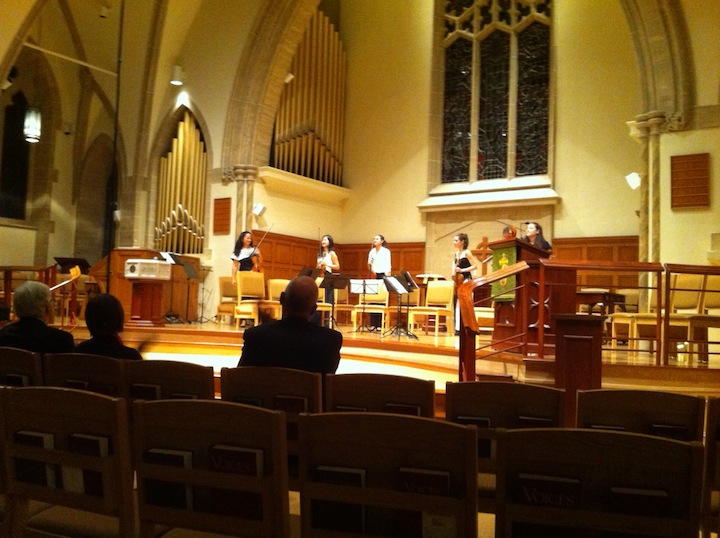
There is a lot of fine chamber music that rarely gets heard live, so thank goodness for organizations like Via Salzburg for not only programming rarities alongside well-known works, but playing them as well as anyone else in the world.
- Classical Music 101: What Does A Conductor Do? - June 17, 2019
- Classical Music 101 | What Does Period Instrument Mean? - May 6, 2019
- CLASSICAL MUSIC 101 | What Does It Mean To Be In Tune? - April 23, 2019
With the help of the building’s warm and generous acoustics, eight musicians presented a compelling, impeccably played programme of Romantic music featuring Felix Mendelssohn’s much-loved Op. 20 Octet — composed in 1825, when he was 16 — and the String Sextet No. 2, O;. 50, by German composer Eduard Franck (1817-1893) at Rosedale United Church on Friday night.
It remains a mystery how Via Salzburg, despite having been around for 13 years now, has never registered its consistent excellence at the hands of founding artistic director, violinist Mayumi Seiler, with a broader audience.
Seiler is not only a commanding soloist, but a fine leader. Her collaborators — usually people with whom she shares a bit of musical history — are invariably well chosen.
Best of all, the programmes mix the familiar, to soothe our insecurities, with something unusual to tickle our adventurous side.
Friday night’s programme presented this sort of thinking at its most effective, not only introducing the virtually unknown Sextet by a nearly forgotten composer (who is no relation to César Franck), but choosing something that could stand up against a masterpiece like Mendelssohn’s Octet.
In both works, Seiler and her colleagues — violinists Min-Jeon Koh, Tori Lindsay and Sarah Nematallah, violinists Carolyn Blackwell and Caitlyn Boyle and cellists Rachel Mercer and John Marshman — played the evening’s music with a precision and clarity that showcased both composers’ deft way with melody and elaborate shows of counterpoint while also deploying the full expressive breadth of Romanticism.
It would have been a pleasure to listen to each piece more than once in the resonant chamber beneath the church’s vaulted ceiling.
The Franck certainly deserves to be heard again.
This composer, who studied with Mendelssohn and, according to the programme notes, was highly regarded by contemporaries such as Robert Schumann, has a distinctive voice, marked by sophisticated use of counterpoint (more than one musical voice speaking at the same time) and abrupt modulations (changes of key). In many ways this piece of Franck’s anticipates the tonal adventures of the late 19th century.
Via Salzburg returns with larger forces for their next concert, on Dec. 7, which will feature Mendelssohn and Vivaldi paired with Georg Muffat and, in a nod to the present day, Kingston-based composer Marjan Mozetich.
Their Feb. 22 concert brings together string quartet music by Sir Ernest MacMillan (longtime conductor of the Toronto Symphony during its formative years) with a quintet by Mozart as well as pieces from the Chinese classical tradition. The final programme, in April sets Franz Schubert off against the late Toronto composer Talivalids Kenins.
For all the details about what these great musicians are up to, click here.
+++
I want to share the beauties of the Franck Sextet, as recorded in a 2004 Audite album made by the Edinger Quartett augmented by violist Leo Klepper and cellist Matthias Donderer (Via Salzburg’s performance was more vivid than this fine but discreet interpretation):
John Terauds
- Classical Music 101: What Does A Conductor Do? - June 17, 2019
- Classical Music 101 | What Does Period Instrument Mean? - May 6, 2019
- CLASSICAL MUSIC 101 | What Does It Mean To Be In Tune? - April 23, 2019



